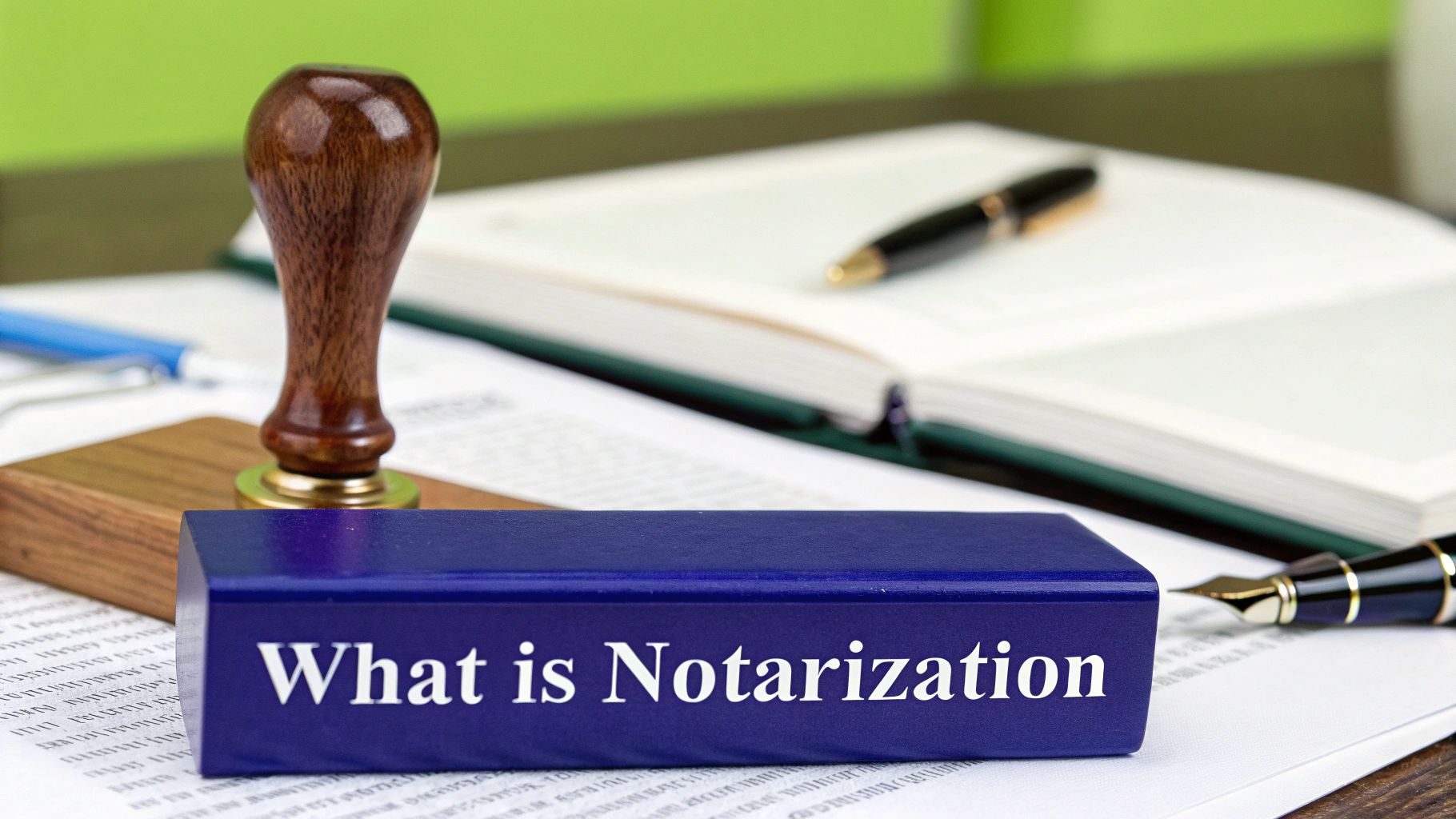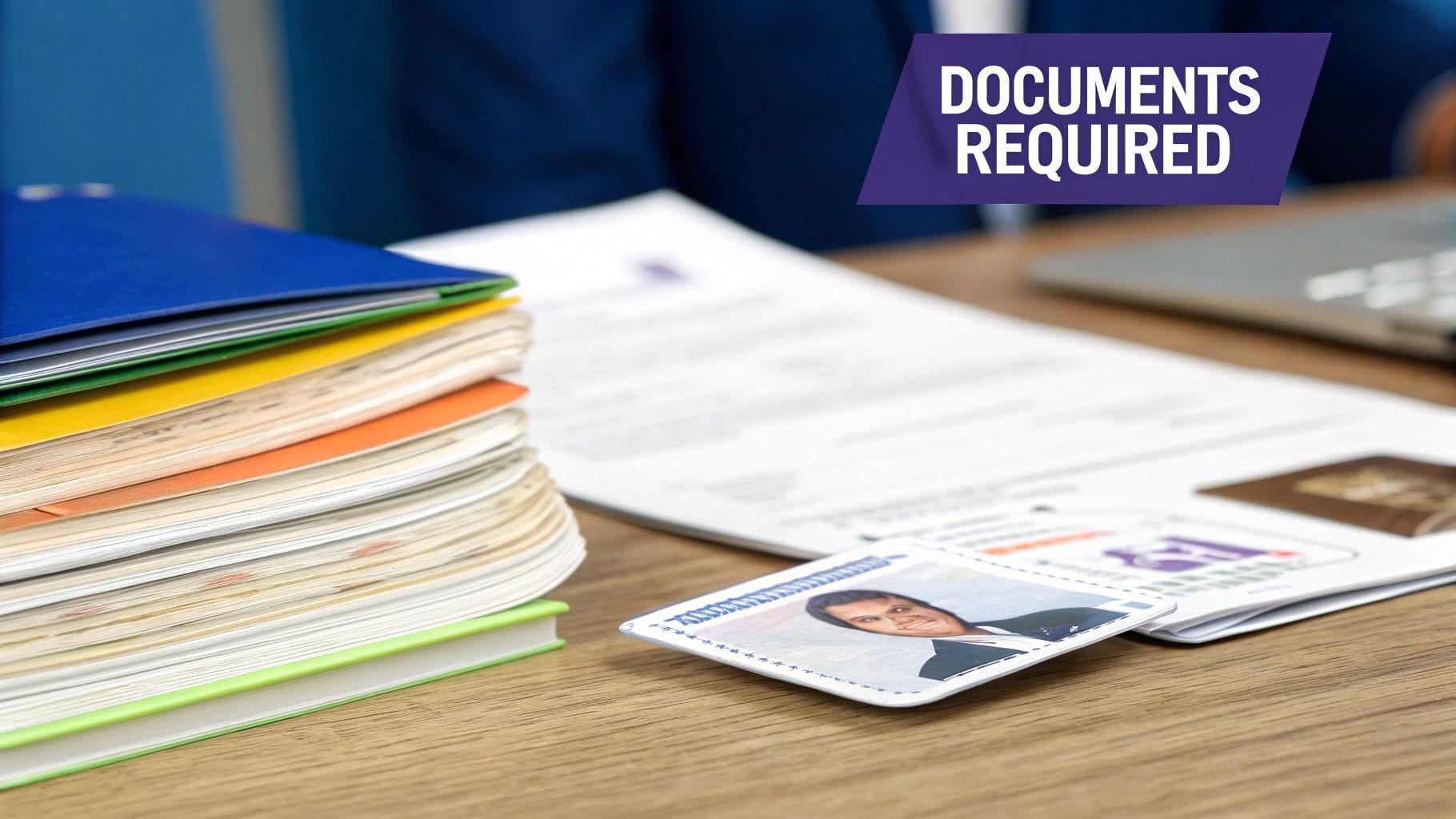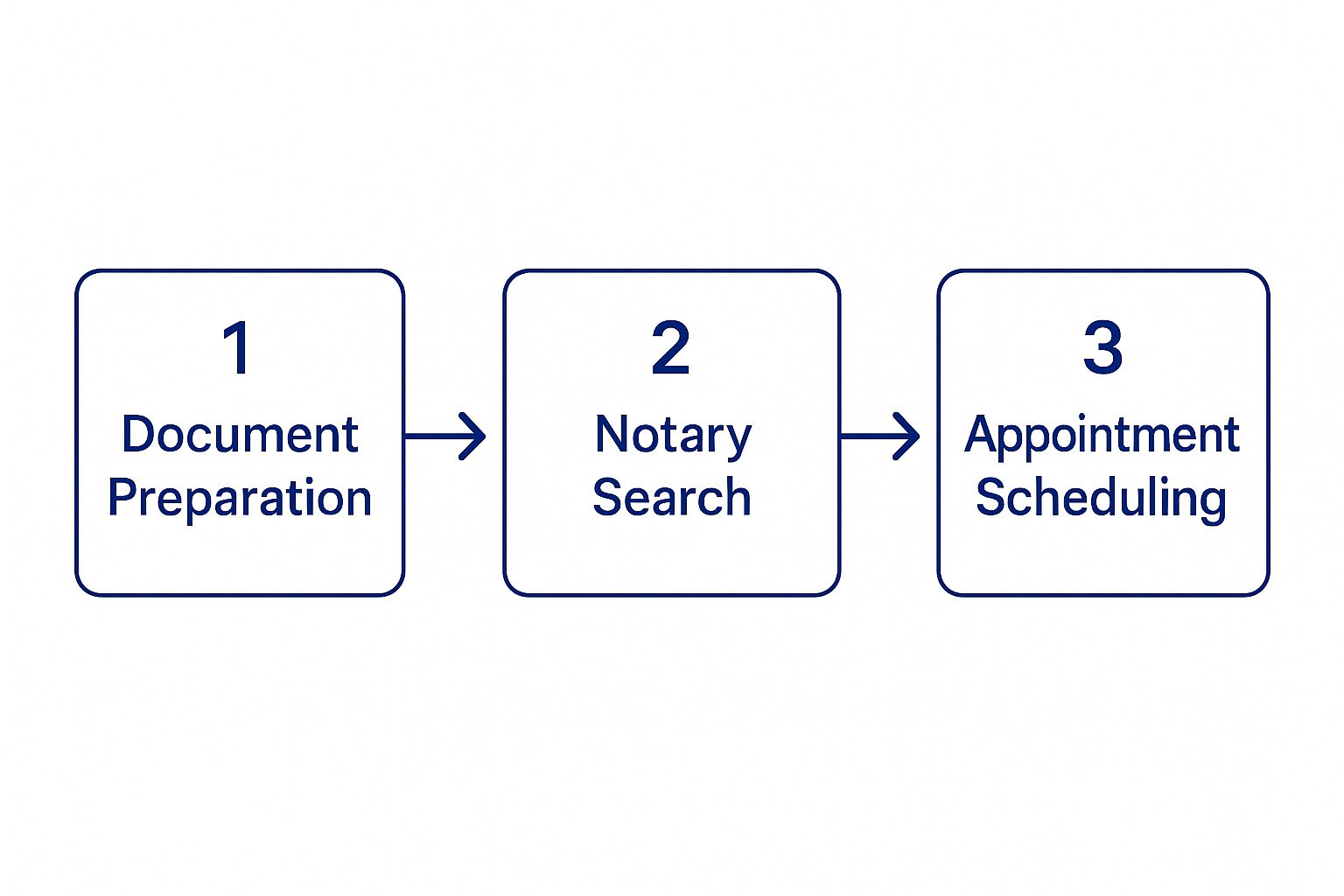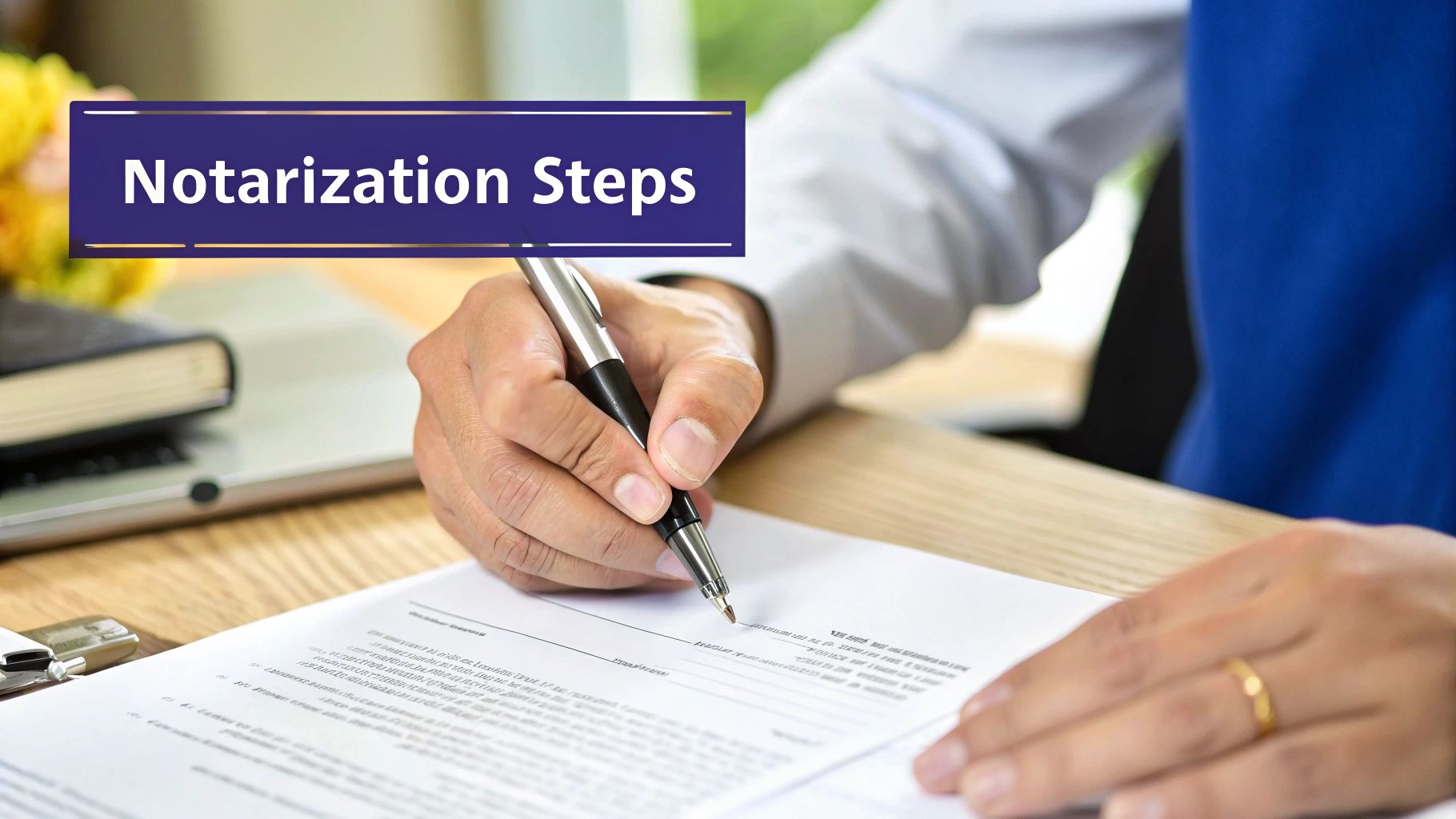How to Get Something Notarized in the Digital Age
- WebsiteFix Technical Partner
- Aug 2, 2025
- 11 min read
Getting a document notarized involves having a commissioned notary public review your unsigned document, verify your identity, and then witness you sign it. For years, this meant a trip to a physical location, but now you can get it done virtually with remote online services or have a notary come to you.
Beyond the Bank: The New Era of Notarization

Remember when you had to rearrange your entire day just to find a notary at a bank or a local shipping store? Thankfully, those days are fading fast. Notarization has finally caught up with the times, thanks to technology and a growing demand for simpler, more accessible solutions. This shift puts you in the driver's seat, allowing you to choose a method that actually fits your life.
This evolution is most obvious with the rapid rise of Remote Online Notarization (RON) and on-demand mobile services. This tech-savvy approach offers a secure and legally binding way to notarize your documents from practically anywhere on the planet, often with 24/7 availability.
The Rise of Virtual and Mobile Services
The biggest change in getting something notarized is the move away from being tied to a specific physical location. Today's options are built around your convenience and schedule, completely transforming the old, clunky experience. Professional document preparation and notarization are no longer a hassle, but a streamlined service.
Two key services are at the forefront of this change:
Remote Online Notarization (RON): This lets you connect with a commissioned notary through a secure video call. Whether you're at home, in the office, or even traveling, you can get your documents legally notarized. Many platforms even offer integrated document preparation assistance.
Mobile Notary Services: If you still prefer an in-person meeting but need it to be on your terms, a mobile notary will travel directly to you. This is a game-changer for situations like real estate closings at a new home or signing documents at a hospital.
The core idea is simple: Notarization should be an efficient task, not a logistical headache. Modern services are designed to remove friction, making the whole process faster and far more user-friendly.
This isn't just a niche trend; it's backed by major legal and market shifts. The global remote online notary service market, valued at USD 101 million at the start of the year, is on track to hit nearly USD 339 million by year's end. This threefold jump shows just how quickly it's being adopted, with 40 U.S. states now having laws on the books that permit online notarizations. You can read more about these market trends and their implications for notarization services.
Setting Your Documents Up for Success

A smooth notarization experience doesn't start when you meet the notary. It begins with a little prep work on your end. Getting your documents in order beforehand is the single best way to avoid frustrating delays, whether you're meeting a mobile notary at a coffee shop or logging in for a remote session.
Here’s the golden rule I tell every client: Never, ever sign your document beforehand. The entire point of a notarization is for the notary to witness you signing it. If you walk in with a pre-signed document, it’s void. You’ll have to print a fresh copy and start all over again.
You also need to make sure the document is completely filled out. Take a moment to scan every page for blank spaces or missing information. A notary is legally prohibited from notarizing an incomplete document because it leaves the door open for fraud later on. For this reason, many modern notary services also offer professional document preparation, ensuring your paperwork is complete and correct before the notarization begins.
Understand the Notarial Act Required
Before your appointment, you need to know what type of notarization is needed. This isn't something the notary can decide for you, as that would be considered giving legal advice.
The two most common acts are:
Acknowledgment: This is where you confirm to the notary that you are who you say you are and that you willingly signed the document. You can technically sign ahead of time for an acknowledgment, but you must appear before the notary to "acknowledge" you did so.
Jurat: This act requires you to sign the document in the physical presence of the notary after taking an oath or affirmation that the statements in the document are true. Affidavits almost always require a jurat.
If you’re not sure which one you need, the best course of action is to contact the person or organization that asked you to get the document notarized. They will give you the correct instructions.
Getting your documents right from the start makes the whole process effortless. For high-stakes paperwork, professional presentation is crucial. When you're setting your documents up for success, looking into options like specialized legal printing services can ensure everything is crisp, clear, and ready for official review.
Finally, have your ID ready. This is non-negotiable. The notary's main job is to verify your identity, so you'll need a valid, government-issued photo ID. A current driver's license, state-issued ID card, or passport is perfect. Make sure it isn't expired
Finding the Right Notary Service for You
Not long ago, getting a document notarized meant tracking down a notary public and traveling to their office. Today’s landscape is dominated by flexible, convenient virtual and mobile options that put you in control.
The decision really boils down to how you prefer to get things done. Traditional notaries still exist, but the real innovation is in services that bring the notary to you, either physically or virtually. For ultimate convenience, many providers offer both document preparation and notarization in one seamless package.
Let's break down the modern alternatives that are changing the game.
Mobile Notary Services: Ultimate Convenience
Imagine trying to finalize hospital discharge papers for a family member, or you're a real estate agent managing a closing at your client's brand-new home. In situations like these, getting everyone to a notary's office is more than an inconvenience—it's often a logistical impossibility. This is precisely where mobile notary services come in.
A mobile notary is a commissioned professional who travels directly to your location. Whether it's your home, office, a hospital room, or even a coffee shop, you get the assurance of a face-to-face meeting without the hassle of travel.
This service is a perfect fit for:
Sensitive Situations: Ideal for individuals with mobility challenges or those in healthcare settings.
Complex Transactions: Invaluable for real estate closings where multiple signers need to be present.
Busy Professionals: A mobile notary can meet you at your office between appointments, respecting your packed schedule.
It's the perfect blend of personal, traditional service and modern, on-demand convenience.
Remote Online Notarization: The Most Flexible Choice
For maximum flexibility and speed, nothing beats Remote Online Notarization (RON). This service lets you connect with a commissioned notary using a secure audio-visual platform on your computer or smartphone, allowing you to get documents notarized from virtually anywhere in the world.
The process is designed to be user-friendly, making it simple to prepare for your session.

Many RON platforms, like Notarize and BlueNotary, are available 24/7. This means you can get a power of attorney notarized at 10 PM on a Sunday if that's when you need it done. The entire process is highly secure, employing sophisticated identity verification and creating a tamper-evident digital seal on your document.
Remote Online Notarization is more than a convenience. It often creates a more secure and verifiable transaction record than traditional methods because the video session is always recorded.
This digital-first approach is fantastic for anyone who needs immediate service, is traveling abroad, or simply values the efficiency of handling important tasks from home.
Comparing Notary Service Options
To help you decide, let's look at a side-by-side comparison of your options. Each has its own strengths, and the best choice depends entirely on your specific circumstances—like your timeline, location, and comfort with technology.
Feature | In-Person Notary | Mobile Notary | Remote Online Notary (RON) |
|---|---|---|---|
Location | You travel to the notary's office (e.g., bank, UPS store) | Notary travels to your chosen location | Anywhere with an internet connection |
Scheduling | Limited to business hours | Flexible; by appointment, including evenings/weekends | On-demand, often 24/7 |
Convenience | Low; requires travel and waiting | High; personalized service at your location | Highest; no travel, instant access |
Cost | Low (per-signature fee) | Moderate (fee + travel charge) | Varies; often a flat platform fee |
Security | Standard in-person ID check | Standard in-person ID check | Advanced digital ID verification & video recording |
Best For | Non-urgent, simple documents when you're nearby | Group signings, real estate, signers with mobility issues | Urgent needs, remote signers, tech-savvy users |
Ultimately, whether you choose the traditional path or embrace a modern alternative, understanding what each service offers is the key to a smooth and successful notarization.
How Remote Online Notarization Actually Works

Getting a document notarized from your couch might sound a bit futuristic, but the process of Remote Online Notarization (RON) is surprisingly simple and secure. It essentially swaps the physical desk for a secure digital platform, allowing you to connect face-to-face with a commissioned notary through a live video session.
It all starts when you upload your unsigned document to a secure RON portal. From there, the system kicks off a sophisticated identity check that’s often more rigorous than what you’d experience in person. This is far more than just a quick glance at your driver's license.
Advanced Identity Verification
Before you ever speak with the notary, the platform needs to confirm you are who you claim to be. This is a crucial security layer that typically involves a two-step check.
Credential Analysis: First, you’ll use your computer or phone camera to capture an image of the front and back of your government-issued photo ID, like a driver's license or passport. Specialized software then scrutinizes the ID’s security features to verify its authenticity.
Knowledge-Based Authentication (KBA): Next, you'll answer a few multiple-choice questions pulled from your personal history. These are dynamic, out-of-wallet questions that only you should know the answers to, such as a previous street you lived on or the monthly payment on a past auto loan.
This robust, two-part verification process is a big reason why RON is considered so secure. Once you clear these hurdles, you're ready for the main event.
The Live Notary Session
After your identity is successfully verified, you’ll join a live, recorded audio-visual session with the notary public. In this meeting, the notary will personally confirm your identity one more time, make sure you understand the document you're about to sign, and watch as you apply your electronic signature in real time.
Once you’ve signed, the notary applies their own digital signature and an electronic seal.
This digital seal is tamper-evident. If anyone attempts to alter the document after it's been notarized, the seal is designed to show that it has been compromised, protecting the document's integrity in a way a traditional ink stamp simply can't.
This whole process is made possible by sophisticated e-notary software that integrates technologies like artificial intelligence and facial recognition to prevent fraud. The efficiency gains are undeniable; some businesses report an 87% improvement in communications and an 89% reduction in project times after adopting similar digital tools.
The technology is central to making RON work. Using tools like HIPAA compliant video conferencing platforms for legal firms is what provides the necessary security for sensitive legal and financial transactions. For a closer look at the benefits, check out our guide on secure and convenient remote online notary services.
Sailing Through Your Notary Appointment
Knowing what to expect when you meet with the notary can make all the difference between a stressful encounter and a smooth, successful signing. Whether you're using a mobile service that comes to your home or connecting to a virtual notary online, the process has a few core components.
The notary isn't there to give you legal advice—in fact, they're legally barred from doing so. Their job is much more specific.
The Notary's Role: A Quick Rundown
A notary public has a few key responsibilities. Their primary duty is to officially verify your identity. They'll do this by examining a valid, government-issued photo ID like a driver's license or passport. So, make sure yours isn't expired!
They also need to confirm that you understand what you're signing and are doing so of your own free will, without any pressure from someone else. Finally, they'll watch you sign the document. For some documents, they might also administer an oath or affirmation where you swear that the information in the document is true.
Once those steps are done, the notary will complete their part: the notarial certificate. This is usually a specific block of text on your document where they'll add the date, location, their signature, and their official stamp or seal. This is the formal evidence that the notarization happened correctly.
Every detail gets logged in the notary's official journal. Think of it as a permanent, secure diary of the event. It’s a crucial record that protects everyone by documenting who signed what, and when.
A key takeaway is that a notary’s job is to verify identity and witness the signing, not interpret the document. They are legally prohibited from explaining the document's contents or advising you on its legal implications.
In a remote online notarization, these same steps happen over a secure, recorded video call. You'll connect with the notary, show them your ID on camera, and they'll guide you through the signing process on your screen. It’s the same official process, just handled digitally.
For a deeper dive into the importance of these official duties, you can learn more about the power of notarization in our complete guide. By understanding the notary’s role, you can approach your appointment feeling prepared and confident, ensuring a successful outcome no matter which method you choose.
Common Questions About Modern Notarization
As you figure out the best way to get your documents notarized, it's natural to have a few questions. This is especially true with newer options like remote and mobile services. Getting the right answers upfront helps you move forward with confidence.
Let's walk through some of the things people ask most often.
Costs and Document Eligibility
Let's be honest, one of the first questions on everyone's mind is cost. The price tag for a notarization really depends on which path you take.
Remote Online Notarization (RON): You'll typically find platforms charging a flat session fee, usually somewhere between $25 to $29. This fee almost always covers your digital appointment and the first notarial act. Some providers may offer document preparation services for an additional fee.
Mobile Notaries: This is a convenience-first service, so you're paying for the state-regulated fee per signature plus a travel fee. Depending on how far the notary has to travel and the time of day, that travel charge can be anywhere from $25 to over $100.
In-Person Notaries: The traditional route—think banks or shipping stores—is often the most budget-friendly. State-mandated fees usually land between $5 to $15 per signature.
The next big question is: can any document be notarized online? For the most part, yes. Standard documents like contracts, affidavits, and powers of attorney are perfect for RON. However, there are a few exceptions. Wills and certain types of trusts, for example, often require in-person witnesses in some states.
Before you book anything, it's always a smart idea to double-check with the person or organization receiving your document to make sure they accept remote notarizations. For a deeper dive, check out our complete guide on how to get documents notarized online.
A Critical Tip: What if you spot a mistake on your document before your appointment? You'll need to get a new, corrected version and leave it unsigned. A notary is legally forbidden from giving advice on how to fix errors or from notarizing a document they know contains mistakes. The session can't move forward until the document is 100% correct.
Legal Acceptance of Remote Notarization
It’s completely understandable to wonder if an online notarization will hold up legally.
The good news is that Remote Online Notarization is legally recognized at the federal level, and the vast majority of U.S. states have passed laws to permit it. Thanks to interstate recognition laws, a document that's been remotely notarized by a properly commissioned notary in a RON-compliant state is generally accepted across the country. Still, the best practice is always to confirm acceptance with the final receiving party.
When you need to get something notarized without the headache of travel or scheduling conflicts, Signature on Demand has you covered. Whether you need a mobile notary to meet you anywhere in Las Vegas 24/7 or prefer the convenience of our secure remote online notarization service, we make it happen. Trust our certified experts for all your document preparation and notarization needs. Learn more at https://signatureondemand.net.




Comments